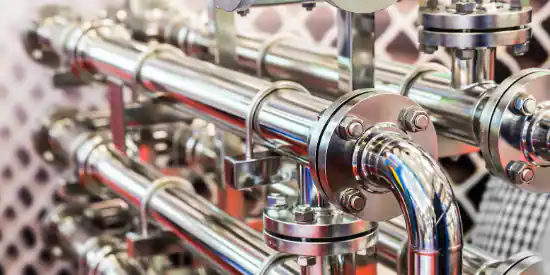Deakin builds clean energy future with two major infrastructure and research projects
Media release
Deakin University will provide a massive boost to Victoria's green economy with the announcement today of two new multi-million dollar projects related to advanced battery research and the development of hydrogen fuel technology.
The Hon. Gayle Tierney MP, Minister for Training, Skills and Higher Education, and the Hon. Lily D'Ambrosio MP, Minister for Energy, Environment and Climate Change and the Minister for Solar Homes, joined Deakin University Vice-Chancellor Professor Iain Martin for the announcement at Deakin's Melbourne Burwood campus this morning.
The two new infrastructure and research projects – BatTRI-HUB 2.0 and the Hycel Technology Hub – will initially create around 200 direct jobs in construction, manufacturing and research, over the life of the projects (2021-2025).
Both projects will involve a tender process that will stimulate local employment and business growth by expanding market and development opportunities for industry. In addition, the facilities will create research innovation and commercialisation opportunities for industry and education and training opportunities for local communities when they are set to open in 2022.
Deakin University, the Victorian Government through its $350 million Higher Education State Investment Fund (VHESIF), the Commonwealth Government, and project partners including Warrnambool Bus Lines, PACCAR Kenworth, Boron Molecular, Future Fuels CRC, Calix+ and SensorPlex, will contribute a combined total of $33.5 million in support of the two projects.
Professor Martin said the projects will further strengthen Victoria's position as the nation's skills and innovation capital.
"These projects exemplify Deakin's industry-led research and innovation and our ability to deliver impact both locally and globally," Professor Martin said.
"The research and its translation will deliver lasting value to communities and industry and extend our investment in regional Victoria and commitment to sustainability."
Deputy Vice-Chancellor for Research Professor Julie Owens said the two projects will support Victoria's green economy through energy storage innovation, paving the way for Australia's clean energy future.
"Materials scientists at Deakin continue to lead the world in high performance battery innovation, advancing their knowledge in making safer, more efficient and longer storage capacity batteries," Professor Owens said.
"And our credentials in the hydrogen research space are well established, thanks to Hycel, one of Australia's first facilities for safely testing, manufacturing, optimising and training in new hydrogen technologies.
"The funding announced today will allow Deakin to further strengthen our expertise and impact in these areas by creating world-class technology capability, and linking this to opportunities for industry, located right here in Victoria."
The projects are:
BatTRI-HUB 2.0
(VHESIF $5.2m, Deakin $4.3m, in-kind contributions from project partners Calix+ and Sensor Plex $0.3 million)
The Battery Technology Research and Innovation Hub 2.0 (BatTRI-HUB 2.0) will be a dedicated, world-class battery technology research and translation facility that specialises in advanced battery design, fabrication and testing.
The new facility will include a pilot production line to manufacture advanced batteries and battery components, an expansion of existing pouch cell prototyping, a cell and pack testing lab, and advanced cell diagnostics and materials characterisation. It will seek to advance existing technologies such as lithium but also focus on sustainable alternatives such as sodium batteries.
The facility will build Victoria's role in the global supply chain for advanced batteries while meeting the bespoke battery needs of customers with demanding applications. It will facilitate collaborative projects with our current partners into the future and catalyse new partnerships with industry.
The facility will also provide post-secondary education and training opportunities in battery production and process engineering and will be included in Deakin's school outreach program.
Construction is scheduled to begin at a site near Deakin's Burwood campus in January 2022 and completion in May 2022, with research and innovation projects to be underway earlier, hosted on campus.
Hycel Technology Hub
(VHESIF $9m, Commonwealth funding $9m ($2m already provided in December 2019), Deakin $2m, in-kind contributions from industry partners PACCAR Kenworth, Future Fuels CRC and Warrnambool Bus Lines $3.7m)
A new research and training facility is to be constructed on the Warrnambool campus, which will become one of Australia’s first regional hydrogen hubs – a key element in Australia's National Hydrogen Strategy – and specialise in the development, testing, training, demonstration and manufacture of hydrogen fuel technology.
The new facility will include a fuel cell wing with specialised fuel cell assembly and testing equipment, plumbed with hydrogen; an innovation space to support SME development and training facilities for hydrogen application technologies; and a multifunctional space for social licence, education and demonstration activities.
Applications of research outcomes will include fuel cells for transport and especially for heavy vehicles, as well as assessing the suitability for natural gas pipelines to carry hydrogen for housing and industry.
For example, Deakin is partnering with Warrnambool Bus Lines to develop an optimisation model for hydrogen refuelling logistics, which supports a plan to transition buses from diesel to hydrogen.
In partnership with South West TAFE, Hycel is developing an education pipeline; connecting industry to vocational and tertiary providers so that workers are ready for the hydrogen jobs of the future.
Construction is scheduled to begin at Deakin's Warrnambool campus in December 2021 and completion in December 2022 with research innovation and design of education programs to be underway in late 2021.
Share this story

